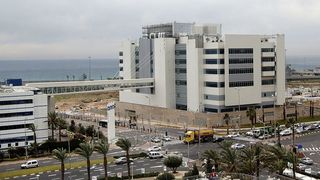Intel Haifa Development Center Cancelled, Site to Be Parking Lot
Ambitious plans for IDC21 come to end.

Update 1/18 01:56 PT
In the original article we incorrectly located Haifa in the south of Israel. Haifa, the third largest city in Israel, is located in the north of Israel. This has been corrected in the story.
Updated Article:
Intel has confirmed that it has cancelled the building of a new development center in Israel. IDC21 was supposed to be built in the Matam Technology Park in Haifa, in the north of Israel. However, the ambitious plans for a modern workspace, offering great facilities for a blend of work and leisure, have fallen victim to a cost cutting exercise. The area is now to be used as a parking lot for use by workers in the technology park.
Israel’s Globes newspaper recounts the timeline of Intel’s IDC21 plans, from the announcement leading up to the present day. Shortly after Pat Gelsinger became CEO in early 2021 he visited Israel - surfing on a wave of optimism and propelled by a booming tech industry thirsty for new semiconductors. In May the same year Intel set out its plans for a new development center, covering thousands of square meters in Haifa – with some of its existing important Israel-based facilities like IDC9 nearby.
Intel’s $200M vision for the new IDC21 center was based around the proposition of a campus featuring; sophisticated laboratories, a visitor center, an auditorium, restaurants and cafes with workspaces, green spaces and sports areas, and even a roof-top health complex with a purported “amazing sea view”. As well as being a new site for serious work, the company thought it could be a health, wellbeing, and leisure facility for other Intel workers in the technology park, as well as locals.

Three months after Gelsinger’s visit, the plans for IDC21 were firmed up, with a visit of then SVP, Gregory Bryant, and the symbolic laying of a foundation stone. Less than 18 months after this formal development step, Intel confirmed the site will instead be converted to a car park to benefit other technology park workers and visitors.
Stay on the Cutting Edge
Join the experts who read Tom's Hardware for the inside track on enthusiast PC tech news — and have for over 25 years. We'll send breaking news and in-depth reviews of CPUs, GPUs, AI, maker hardware and more straight to your inbox.
Regular Tom’s Hardware readers will be well aware of the current pressures on the technology business. Semiconductor makers like Intel are being particularly hard hit by another contraction in the business cycle, and the wider recession. Confining our observation to Intel’s business, there have already been some signs foretelling this Israel decision. Over recent months Intel has delayed Magdeburg mega fab plans, cancelled construction projects in Oregon and India, and cut various smaller real-estate developments.
Intel’s Statement
Intel provided a statement to Globes which indicated that the ditching of IDC21 plans were part of a wider cost cutting exercise by the company. “Intel is acting to maximize the usage of its real estate with the aim of creating a dynamic and comfortable work environment for its employees, while cutting costs,” read the statement. “We therefore decided to halt construction of IDC12 and complete construction of the parking lot.”
If there is some encouraging news to be extracted from this, it is that Intel appears to be restricting its investment and expenditure cutting exercise to bricks and mortar. It is keeping existing employees, and that will be important to Israel where it is, according to Globes, the country’s largest employee with 12,000 employees plus 2,000 at Mobileye. We really hope that the industry will see green shoots soon, so that jobs and the pace of semiconductor R&D don’t get impacted by cuts.
Apple continues with its development center plans at the same Matam Technology Park industrial zone. Globes reports that the new Apple facility, with 46,000 square meters of space, will be formally opened for business “very shortly.”

Mark Tyson is a Freelance News Writer at Tom's Hardware US. He enjoys covering the full breadth of PC tech; from business and semiconductor design to products approaching the edge of reason.
-
PlaneInTheSky It makes no sense to have chip factories in Israel. They can't offer the subsidies other trading blocks can. With chips getting more and more expensive to make, chip companies are looking for billions in state subsidies, which Israel can not offer.Reply -
InvalidError Reply
A design center is not a fab. Most of it is office and lab space for R&D. AMD doesn't need office space at TSMC's fabs to design chips and write drivers either.PlaneInTheSky said:It makes no sense to have chip factories in Israel. They can't offer the subsidies other trading blocks can. With chips getting more and more expensive to make, chip companies are looking for billions in state subsidies, which Israel can not offer. -
Senile Otaku ReplyPlaneInTheSky said:It makes no sense to have chip factories in Israel. They can't offer the subsidies other trading blocks can. With chips getting more and more expensive to make, chip companies are looking for billions in state subsidies, which Israel can not offer.
Sorry, but if a company can't manage to survive without being subsidized from the taxpayer's wallet, then they have no business being IN business. -
kjfatl Reply
If we follow you logic, China can subsidize it's chip business for 15 years, selling every part at a loss. At the end of 15 years, shortly after Intel, Nvidia, TI, Global Foundries, TSMC and Samsung go out of business we will have no choice other than buy all of our semiconductors from China. This is the Chinese business/military model. Pick a business to conquer. Sell product at a loss until there is no remaining competition, raise prices and enjoy the profit. The only thing that is keeping this from happening is government subsidies in the form of direct subsidies, import restrictions or tariffs.Senile Otaku said:Sorry, but if a company can't manage to survive without being subsidized from the taxpayer's wallet, then they have no business being IN business. -
husker Intel is taking corporate doublespeak to a new level with their statement:Reply
"Intel is acting to maximize the usage of its real estate with the aim of creating a dynamic and comfortable work environment for its employees, while cutting costs."
Translation: Here's a parking lot instead. You're welcome. Now go enjoy your new dynamic and comfortable work environment. -
Metteec From the amount of work already put into that building, this appears to be a significant write down. I wonder if it is Intel or Tel Aviv that will end up footing the bill?Reply -
rluker5 Reply
How much work has been done? Don't leave us hanging.Metteec said:From the amount of work already put into that building, this appears to be a significant write down. I wonder if it is Intel or Tel Aviv that will end up footing the bill? -
kep55 Reply
Intel is throwing off over four hundred million in cash every week. The need subsidies as much as a submarine needs screen windows. Tax subsidies for 99% of all businesses is just a money grab the only benefits wall street and not main street. This is based on my twenty plus years of reviewing tax incentive programs.PlaneInTheSky said:It makes no sense to have chip factories in Israel. They can't offer the subsidies other trading blocks can. With chips getting more and more expensive to make, chip companies are looking for billions in state subsidies, which Israel can not offer. -
Endymio ReplyIDC21 was supposed to be built in the Matam Technology Park in Haifa, in the south of Israel ...
Err, Haifa isn't in the south of Israel. It's in the north, along the coast.
Which means it would take roughly 125 weeks of 100% of that profit to finance a $50B next-gen fab. And that of course assumes Intel will be as profitable this year as they were last .... which of course they won't be.kep55 said:Intel is throwing off over four hundred million in cash every week. The need subsidies as much as a submarine needs screen windows
Most Popular

